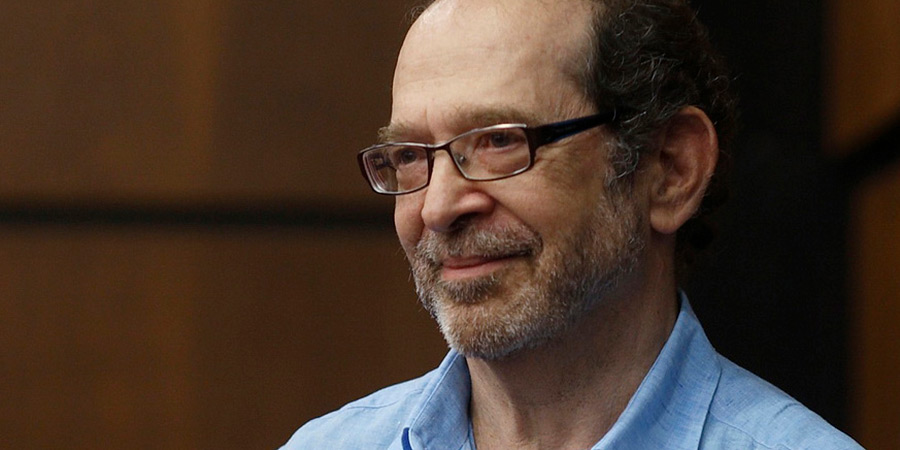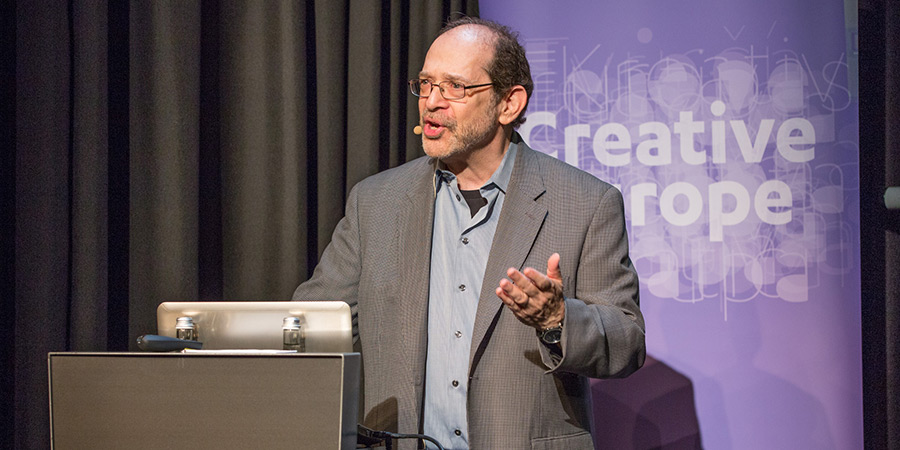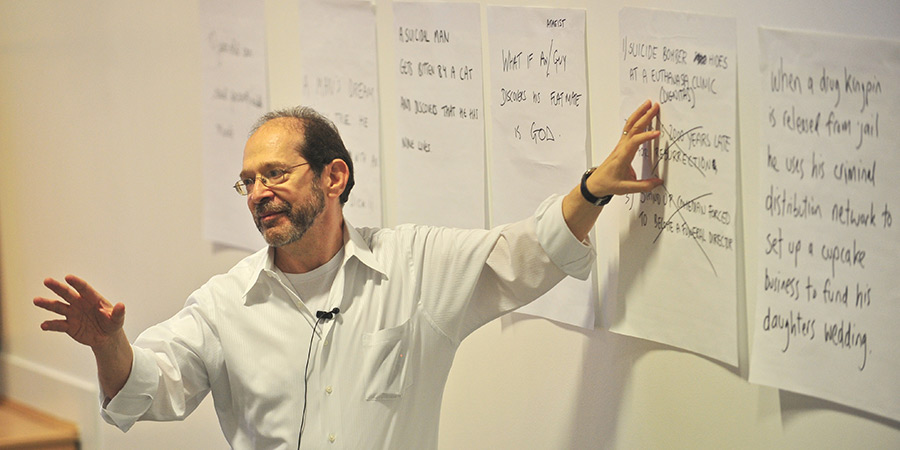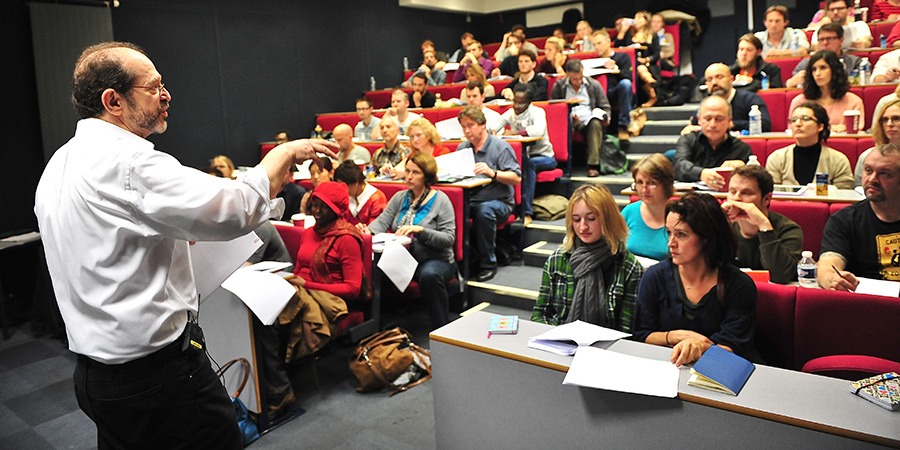Steve Kaplan on bringing his Comedy Intensive workshop to London

Tutor Steve Kaplan will be in London this November (Saturday 9th & Sunday 10th) to run a version of his Intensive Comedy course at King's Place. We talk to Steve to find out more:
How did you first get involved in the world of comedy writing?
I started out in the theatre - first as an actor, then as a director. I've been fascinated with comedy since I was a kid. (Full disclosure - I was a class clown. Actually, a failed class clown. Most of the time, the other kids just stared at me confused as to what I was saying or doing. But the few times I made the whole class laugh? Heaven!)
So when an actor friend of mine suggested we start a theatre company in New York, I pitched the idea of being a theatre completely devoted to comedy. I thought it would help us stand out from a rather crowded Off-Broadway crowd and I loved the idea of exploring all aspects of comedy - theatre, stand-up, sketch, improv - and expanding the conception of what comedy could be.
As artistic director of the Manhattan Punch Line Theatre, I also served as dramaturg, working with writers, directors, and performers as they mounted their productions, as well as directing classic comedies by Kaufman and Hart and shepherding premieres of new comedies.
Along the way, I worked with people who went on to significant careers: David Crane (Friends, Episodes), David Ives (All In The Timing), Peter Tolan (The Larry Sanders Show, Analyze That), Nathan Lane and John Leguizamo.

From there, how did you develop your own knowledge and skills?
As a producer of a small Off-Broadway theatre, I was there every night: selling tickets, selling refreshments, working the manual elevator, cleaning the bathrooms. And so I watched every show. And I started to notice that when the show wasn't going well, the actors would come off stage and say something to the effect of, "What a terrible audience!" Except that I was in the audience, and I knew I wasn't terrible. Sure, I wasn't going to laugh at the same jokes I've heard a dozen times, but I could still enjoy the performances. And, on those off nights, I started to notice that there was a difference in what the actors were doing in their approach to the material and to their characters. They weren't huge changes, but still, the performances were slightly different. It turns out it wasn't the audience that was terrible; it was something we were doing.
I started to wonder, 'why is something funny on a Thursday, but no longer funny on a Sunday?' 'Why is a script hilarious the first time you read it through with the cast, but then, slowly and subtly, it sometimes gets less and less funny. What's going on?'
At the time, I was teaching an improv class, and so I started to introduce games and activities that tried to get at the heart of comedy, what my friend Brian Rose used to call "the physics of comedy": how it worked, why it worked, what was happening when it didn't work, and most importantly, how the hell can you fix it.
That was the beginning of what became a forty week course in approach to comedy, and many of the tools, techniques and principles became the basis of my first book, The Hidden Tools of Comedy.
When I moved to Los Angeles, a guy who had been working with Robert McKee came up and asked me, "Can you teach this stuff to writers?". That became the basis of the Comedy Intensive weekend workshop.
What do you think are the most important elements when it comes to comedy writing?
Surprisingly enough, it's not the jokes. Funny is subjective. Some people who like Seinfeld don't like Friends, and visa versa. And then there are the people who think The Bear is a comedy. (Confession: I'm might just be one of those people.)
Since funny is subjective, what's important when writing comedy is telling the truth about yourself, your friends, your family, your world.
Dorothy Parker once described the ability to write comedy as being able to have "a sharp eye, and a wild mind." I'd add the perception to see the absurdities of the world we live in, the courage to include yourself as part of that absurd world, and the ability to share that truth with others. And the occasional dick joke.

Tell us about the Comedy Intensive format...
The Comedy Intensive is a two-day course that explores the hidden truths and principles of comedy: what it is, how it works, why it works, what's happening when it's not working and what you can do to fix it, and offers proven and practical methods and techniques, that you can use in writing, directing or performing comedy.
On day 1, we focus on the Hidden Tools - useable, practical tools like Non-Hero, Metaphorical Relationships and Straight Line/Wavy Line - principles and techniques that you can apply immediately to your work.
Day 2 focuses on character, comic premise, the structure of comic narratives in film and television, and specific ways of applying the tools to text.
The workshop includes interactive exercises, solo and group writing activities, as well as a liberal use of clips from current and classic comedies to illustrate our points and principles.
Finally, it's just a lot of fun - you're in a room with a talented, funny group of people sharing perspectives on the art, science and philosophy of comedy. It's a very interactive experience. Imagine Robert McKee, only with more laughs.
You lead this course around the world. Is there anything you have to modify when thinking about British humour/industry?
According to Stephen Fry, it's the difference between America optimism and British pessimism. American comedy is aspirational, whereas British comedy is about accepting the loss of empire.
But I think even those differences are blurring, if not disappearing. There's plenty of depressed, defeated submissive protagonists in American comedy, and I've noticed an uptick in aspirational, optimistic characters in British comedy.

So Comedy Intensive will be London on 9th and 10th November 2024. Are you looking forward to visiting? What can people expect from this latest run?
I love London! My only regret is that I won't be able to spend a lot of time here after the weekend - I'm on a plane right away to Milan right away to teach the course at the Universita Cattolica.
What can people expect? Well, and in the words of some of the people who have attended the course, at least a couple of things:
- They'll learn useful tools.
"I wrote...my best, funniest sketches thanks, in no small part, to the lessons I learned from Steve Kaplan's comedy classes. Steve breaks the fine art of comedy down... that helps the unfunny become funny, and the funny become funnier." - David Fury (Emmy-winning writer/producer, 24, Lost, Buffy the Vampire Slayer and more!)
"It was wonderful! I came back to new pages on a greenlit script at [unnamed big studio] and used what I learned this weekend to understand why the comedy wasn't working. And based on our lessons, I immediately knew how to make it better. I received tools I'm applying to every project regardless of genre!" - Nikki Levy (film producer)
- They'll experience "Aha!" moments.
"The material he covered confirmed some things we had only guessed at and also opened new doors. There were several moments when his observations rang bells, lit bulbs, threw switches. Simple human truths are often like that. We slap our foreheads and say, 'I knew that - why did I never think it?' Wise men like Kaplan tell us things written in our DNA." - Tim Ferguson (writer/producer, Circle Work and author of The Cheeky Monkey)
- They'll laugh. A lot!
"This workshop was a real eye opener for me. I got a whole new amazing perspective on the nuts and bolts of comedy from a true master Steve Kaplan. His insight into what works and doesn't work was mind blowing and the way he broke down the archetypes in comedy was fascinating. I had never worked from this kind of perspective before and it really made sense the way Steve clearly gave us the tools to work in this genre in a practical coherent way. The class was also tons of fun, and very freeing. Had a blast! We all laughed like crazy." - Ellen Dubin (actor)
This article is provided for free as part of BCG Pro.
Subscribe now for exclusive features, insight, learning materials, opportunities and other services for comedy creators.

